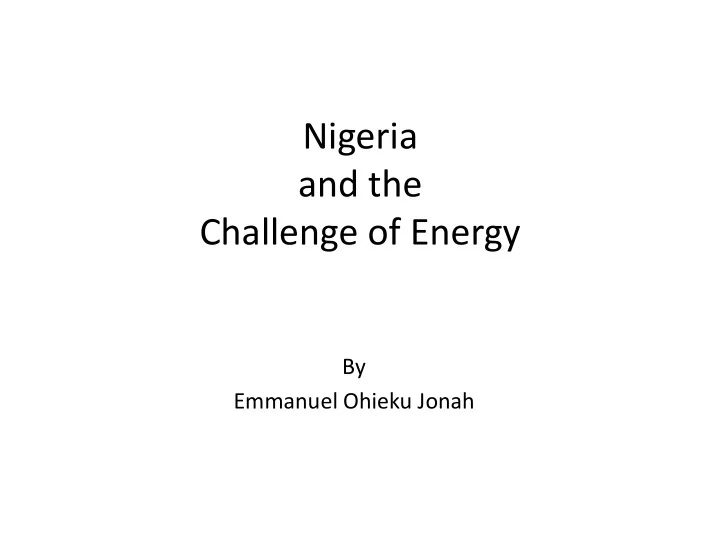

Nigeria and the Challenge of Energy By Emmanuel Ohieku Jonah
Federal Republic of Nigeria Green means Agriculture White means peace &unity Named Nigeria by Flora Shaw Independence: 1 st October 1960 36 states and capitals Abuja – Federal Capital Territory Size is 923,768 sq km (356,667 sq mi ) Bounded by Niger – in the north Benin – in the west Chad and Cameroon - in the east Atlantic ocean – in the south
People, Language Ethnic groups Over 250 ethnic groups Yoruba 21% Igbo 18% Hausa/Fulani 29% Official language: English Over 500 spoken languages (Adegbija, Efurosibina E. (2003). Multilingualism: a Nigerian Case Study. Africa World Press.)
Population 140 million people (2006 census figures, http://www.nigeriamasterweb.com/Nigeria06CensusFigs.html It is said that 1 in every 6 African is a Nigerian Countries and Areas Ranked by Population:2011 Countries and Areas Ranked by Population:2050 Rank Country or Area Population Rank Country or Area Population 1 India 1,656,553,632 1 China 1,336,718,015 2 China 1,303,723,332 1,189,172,906 2 India 3 United States 422,554,384 311,050,977 3 United States 4 Nigeria 402,425,535 4 Indonesia 245,613,043 5 Indonesia 313,020,847 5 Brazil 203,429,773 6 Pakistan 290,847,790 6 Pakistan 187,342,721 7 Ethiopia 278,283,137 7 Nigeria 165,822,569 8 Brazil 260,692,493 8 Bangladesh 158,570,535 9 Bangladesh 250,155,274 9 Russia 138,739,892 10 Philippines 171,964,187 10 Japan 127,469,543 Source: U.S. Census Bureau, International Data Base, http://www.census.gov/population/international/data/idb/rank.php
Pre - Independence Became a British protectorate in 1901 North and South amalgamated in 1914 Ruled by 9 British Governor Generals from 1914 to 1960 Present 36 states and capitals. The three regions created by British colonial rule in 1954.
Post Independence Nigeria’s biggest problem since independence has been its political instability. This is strongly related to the ethnic differences. To date, Nigeria has had 14 Presidents in her 51 years of independence. Civilian presidents Military presidents Dr. Nnamdi Azikiwe -1960 to 1967 Gen. Aguiyi Ironsi - Jan 1966 to July 1966 Gen. Yakubu Gowon – 1966 to 1975 Gen. Murtala Mohammed – 1975 to 1976 Gen. Olusegun Obasanjo – 1976 to 1979 Alh. Shehu Shagari – 1979 1983 Gen. Muhammadu Buhari – 1983 to 1985 Gen. Ibrahim Babangida – 1985 to1993 Ernest Shonekan – Aug. 1993 to Nov. 1993 Gen. Sani Abacha – 1993 to 1998 Gen. Abdulsalam Abubakar 1998 to 1999 Gen. Olusegun Obasanjo – 1999 to 2007 Alh. Umaru Yar’Adua – 2007 to 2010 Dr. Goodluck Jonathan -2010 till date The ethnic differences led to the Nigerian civil war (July 1967 to Jan. 1970).
Resources Prior to the discovery of crude oil, Nigeria’s economy was largely based on agriculture. The country used to be the world’s largest exporter of cocoa, groundnut and palm oil. Now the country ranks 4 th in the global production of cocoa, and the famous groundnut pyramids of the 1960s have all disappeared. Groundnut pyramids. Kano, Nigeria Farmers working in a cocoa farm. Ikom Nigeria Other underexploited resources in Nigeria include coal, gold, bitumen, iron ore and uranium. The economy is dependent largely on crude oil which accounts for 80% of Government earnings and 40% of the GDP.
Electricity Power Generation 40% of population connected to National grid No power supply more than 60% of the time 4000 MW available of 15000 MW required Projected 2015 demand set to about 28000 MW Nigeria’s electricity sources Source % Contribution Hydropower 36 Thermal (Gas and Oil) 64 (39 & 25 respectively) Source: Energy Commission of Nigeria. http://www.energy.gov.ng Source: "Nigerian National Electricity Grid." Global Energy Network Institute www.geni.org/globalenergy/library/national_energy_grid/nigeria/nigeriannationalelectricitygrid.shtml
As at 2009, an estimated 60 million Nigerians own a generating set and spend about N1.56 trillion ($13.35 million) to fuel them annually. Source :Vanguard Newspaper, 26 th January 2009. The majority of the population who can’t afford electricity relies on fuelwood to even cook a meal. It is estimated that about 79000 people have died from health related issues associated with inhaling smoke from fuelwood (http://greennigeria.wordpress.com/2011/08/11/a-nigerian-quest-for-better-use-of-wood-fuel ) A lady using fuel wood to cook Telecommunication masts relies on company installed generators source: (http ://www.trussnetltd.com/pictures.php ). The country’s reliance on personal generators increases the price of goods and services.
Energy form Policies Oil Increase refining capacity Endorse exploration looking for more oil reserves Privatize the oil industry Derive more economic benefits from the oil reserves Natural Gas Utilize the nation’s NG reserves into the energy mix More gas exploration Encourage privatization Eliminate flaring by 2008 Tar Sands Encourage tar sands exploration driven by the private sector Extract oil from tar sands Coal The nation will resuscitate the coal industry for export in an environmentally friendly manner Nuclear Pursue nuclear as part of the energy mix Hydropower Fully harness the hydropower potential (in particular smallscale) through environmentally friendly means and through the private sector Promoting rural electrification through SHP Fuelwood Promote the use of alternative energy sources to fuelwood De-emphasize fuelwood as part of the nation’s energy mix Solar Help develop the capabilities to utilize solar energy Biomass Promote biomass as an alternative energy resource Wind Help develop capabilities to utilize wind energy Hydrogen Help develop local production capacity for hydrogen Other renewable Will remain interested in other emerging energy sources. Source: Julia Kennedy-Darling et al “The Energy Crisis of Nigeria An Overview and Implications for the Future” University of Chicago
Recommend
More recommend